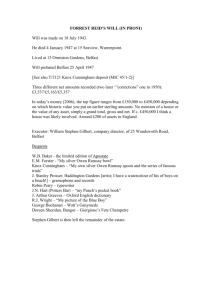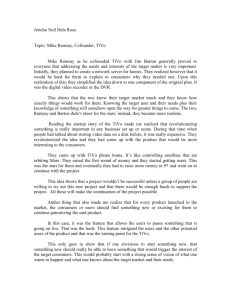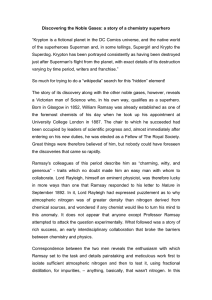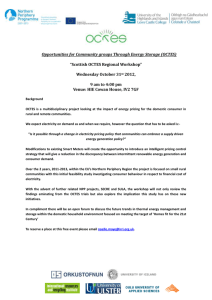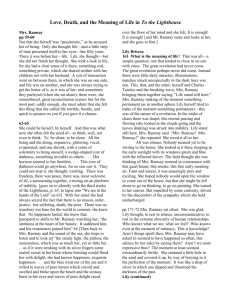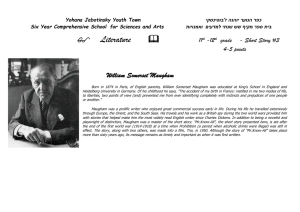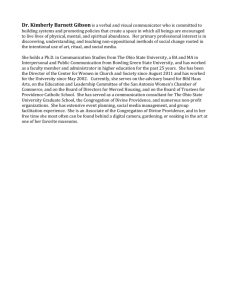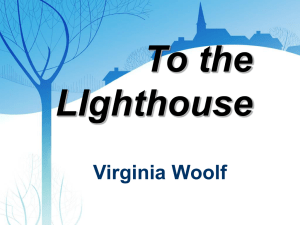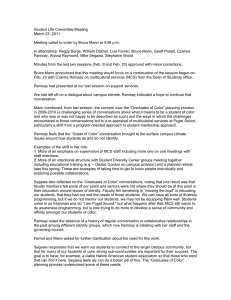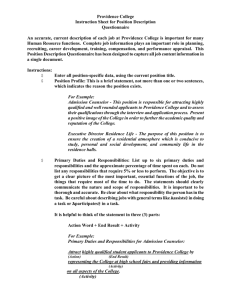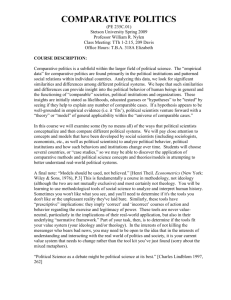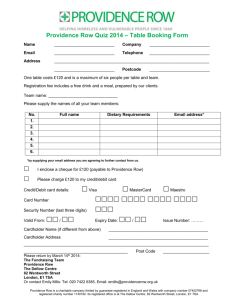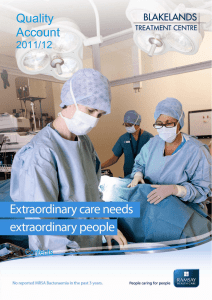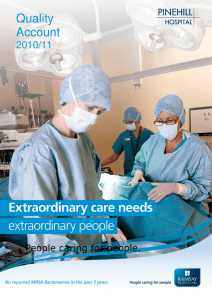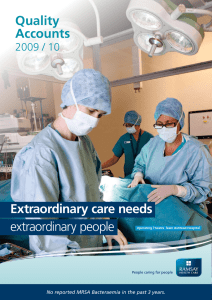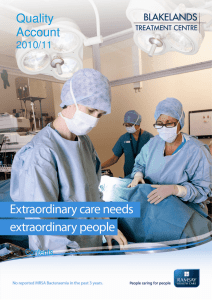Choral Evensong (Ramsey Sermon)
advertisement
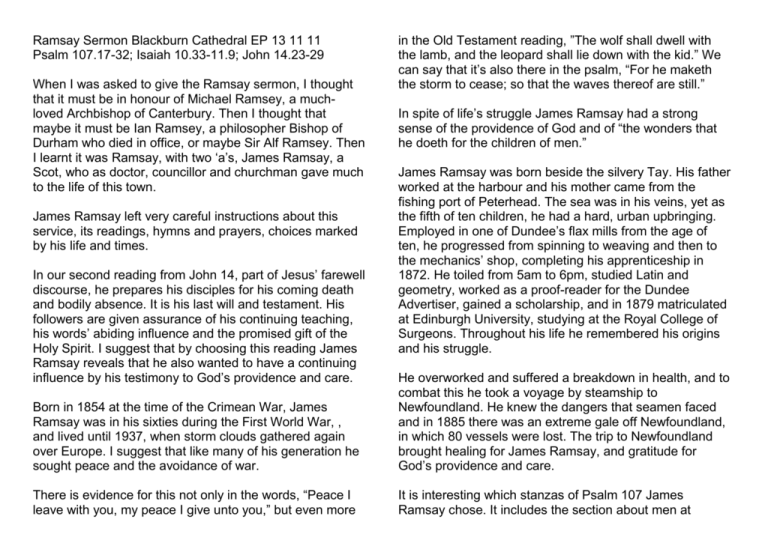
Ramsay Sermon Blackburn Cathedral EP 13 11 11 Psalm 107.17-32; Isaiah 10.33-11.9; John 14.23-29 When I was asked to give the Ramsay sermon, I thought that it must be in honour of Michael Ramsey, a muchloved Archbishop of Canterbury. Then I thought that maybe it must be Ian Ramsey, a philosopher Bishop of Durham who died in office, or maybe Sir Alf Ramsey. Then I learnt it was Ramsay, with two ‘a’s, James Ramsay, a Scot, who as doctor, councillor and churchman gave much to the life of this town. James Ramsay left very careful instructions about this service, its readings, hymns and prayers, choices marked by his life and times. In our second reading from John 14, part of Jesus’ farewell discourse, he prepares his disciples for his coming death and bodily absence. It is his last will and testament. His followers are given assurance of his continuing teaching, his words’ abiding influence and the promised gift of the Holy Spirit. I suggest that by choosing this reading James Ramsay reveals that he also wanted to have a continuing influence by his testimony to God’s providence and care. in the Old Testament reading, ”The wolf shall dwell with the lamb, and the leopard shall lie down with the kid.” We can say that it’s also there in the psalm, “For he maketh the storm to cease; so that the waves thereof are still.” In spite of life’s struggle James Ramsay had a strong sense of the providence of God and of “the wonders that he doeth for the children of men.” James Ramsay was born beside the silvery Tay. His father worked at the harbour and his mother came from the fishing port of Peterhead. The sea was in his veins, yet as the fifth of ten children, he had a hard, urban upbringing. Employed in one of Dundee’s flax mills from the age of ten, he progressed from spinning to weaving and then to the mechanics’ shop, completing his apprenticeship in 1872. He toiled from 5am to 6pm, studied Latin and geometry, worked as a proof-reader for the Dundee Advertiser, gained a scholarship, and in 1879 matriculated at Edinburgh University, studying at the Royal College of Surgeons. Throughout his life he remembered his origins and his struggle. Born in 1854 at the time of the Crimean War, James Ramsay was in his sixties during the First World War, , and lived until 1937, when storm clouds gathered again over Europe. I suggest that like many of his generation he sought peace and the avoidance of war. He overworked and suffered a breakdown in health, and to combat this he took a voyage by steamship to Newfoundland. He knew the dangers that seamen faced and in 1885 there was an extreme gale off Newfoundland, in which 80 vessels were lost. The trip to Newfoundland brought healing for James Ramsay, and gratitude for God’s providence and care. There is evidence for this not only in the words, “Peace I leave with you, my peace I give unto you,” but even more It is interesting which stanzas of Psalm 107 James Ramsay chose. It includes the section about men at death’s door, crying to the Lord and finding healing and deliverance. Coming close to death in early life often contributes to a strong sense of purpose, and for a Christian, a sense of being saved for a purpose. strong sense of God’s hand upon my life and God’s care, helped by the GP and by my parents, I developed a sense of being called to serve, and briefly as a child considered medicine. Of course, the selected verses of Psalm 107 include the stanza about “Those that go down to the sea in ships..” verses engraved on the hearts of people from maritime communities who have so often experienced awe and wonder in the face of nature’s power, life’s precariousness and the presence of God. Dr Ramsay gave himself to the town of Blackburn, marrying and settling here permanently in 1891. In frock coat and broad-brimmed silk hat he was a familiar figure as the Factory Doctor. By 1896 he was a Conservative councillor for St. Mark’s Ward, by 1908 an alderman and was Mayor of Blackburn for the years 1922-1924. He had started his working life in a mill and served in this town as a doctor until the day before he died. At times of calamity and rescue we naturally rejoice with survivors and weep with those facing loss. There are no easy answers when some perish in the ocean depths, in the rubble of an earthquake, in the mayhem of a terrorist attack or a horrific road accident. Still today we cry out to God and seek, help and meaning. Sometimes when we look back we may see God’s hand upon our lives. Although he lived in Blackburn for nearly fifty years, he always had a sense of being an outsider, with roots in the Scottish NE. Like many Scots he was hardworking, even overworking, with a strong motivation. He trusted in God’s purposes and was caught up in a life of service. On the way to the D-Day landings a fellow soldier gave my father a copy of his poem because he knew he would not survive. My father served in the Gordon Highlanders of whom it was written, “So Few got Through”. He was fortunate to survive the war and to marry an attractive Scots’ lass and two years later I was born. Maybe some good things come even out of war. Providence has long been a very strong theme in Scottish Christianity, especially in its Calvinist forms, and it is difficult to underestimate its influence. Yet we too can trust in God’s continuing care and providence without believing that everything is worked out for us. Choices, accidents and errors can all be used by God who weaves a creative design when all we may see are tangled threads. One day I was in my pram on the front pavement, and for some reason my mother moved me to the back. A few minutes later a runaway pop lorry ran into the front of our house where I had been sleeping. With that story and my recovery from bronchial pneumonia, I too grew up with a I guessed the hymns before I knew them. With the theme of “the wonders of God’s providence in the world,” my mind immediately went to “God moves in a mysterious way, his wonders to perform.” This hymn was exceedingly popular In Scotland, and was one of my Gran Baxter’s favourites. It has traditionally been sung to Dundee (what else) or London New, both dating from different versions of the Scottish Psalter. This hymn speaks of the impenetrable and mysterious ways of God, and there is evidence of its influence on Lancashire millworkers in the 1840s. We can say that the hymns connect with mill and ocean, Dundee and Blackburn. Providence is a difficult theme, but with Dr Ramsay’s chosen texts, hymns, sermon theme and subject for prayer, we may realise that he was simply writing a prescription: “Look back over your life, thank God for his care, wonder at his purposes and continue and press on his service where he has called you.”
